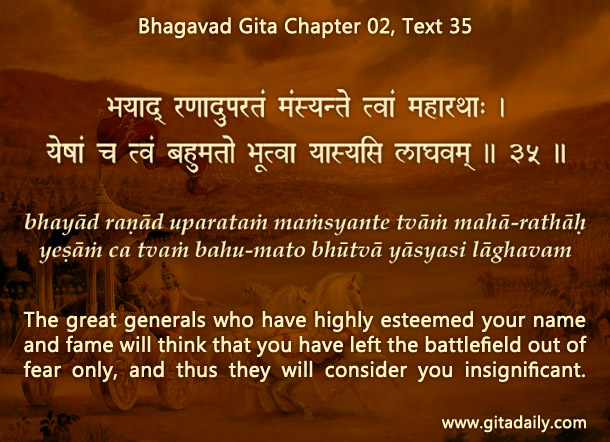When we are driving for an important and urgent meeting, if someone cuts ahead of us, we may decide not to chastise or sue that person because we want to reach our meeting on time.
Similarly, many of life’s problems are not worth fighting. If we are ruled by a macho man attitude, then we may think of turning away from problems as a cowardly running away. But not all turning away is running away – some of it can be walking away.
The difference between the two is often a difference of attitude and purpose. When we run away from a problem, our consciousness is consumed by the scariness of the problem and our inability to deal with it. Our only concern is to somehow run for refuge somewhere, where it doesn’t matter, as long as it is away from the problem. When Arjuna recoils from a gruesome war with his relatives, Krishna reproaches him by reminding him (Bhagavad-gita 02.35) that his enemies will deem his actions as a cowardly running away.
But the same Gita recommends walking away when it (06.11) recommends that yogis renounce the world and go to a secluded place for practicing meditation and striving for liberation. We can walk away not just by physically distancing ourselves from irritants, but also emotionally turning away from them. The Gita (02.14) recommends such emotional distancing when it urges Arjuna to tolerate the unpleasantness caused by life’s dualities.
When we walk away from problems, either physically or emotionally, we focus on what we are moving towards, not what we are moving away from. That positive focus makes walking away not spinelessness, but mindfulness – a hard-eyed discretion that enables us to put first things first, thereby clearing the way for our significant successes.
To know more about this verse, please click on the image
Explanation of article:

Podcast:


Hare Krishna dear Chaitanya Charan Prabhu,
Your daily ‘Gita Wisdom’ articles are very helpful reminders that help, inspire and enrich us, therby enabling us to deal with the intensely emotional environment in our work places, which otherwise can completely say our emotional energy.
Thank you very very much.
Hare Krishna.
Thank you, Sanjiv P. Happy to be of service to you by sharing Krishna’s message
ys
ccdas
Facing the problems is the best way to success in life